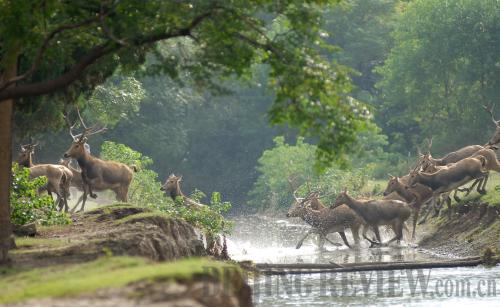|
 |
|
Jiangsu Dafeng Milu National Nature Reserve (XINHUA) |
In the exhibition area of the World-Wide Fund for Nature in the International Organization Joint Pavilion of the World Expo in Shanghai, there are two national treasures of China—pandas and Pere David's deer (usually called milu in Chinese)—both among the rarest 10 species in the world.
It has been 25 years since Pere David's deer returned to their home area. China is effectively restoring their wild population, said Ding Yuhua, Director of Jiangsu Dafeng Milu National Nature Reserve.
Ding came to the reserve as a fodder technician 25 years ago, then the first time he and other staff at the reserve had seen the animal. They didn't even have basic information about the life habits and biological characteristics of the deer, or any other experience. Now, the reserve has the world's largest wild population of Pere David's deer and its largest gene base.
Growing up naturally
"In domestic circumstances, because of the limitations of the region, the population of Pere David's deer is not able to grow quickly. And domestication is not able to preserve the animal's wild nature and can't really save and propagate the species," said Ding.
In the autumn of 1998, Ding and his colleagues conducted an epochal experiment—sending eight carefully selected Pere David's deer (two males, four females, two offspring) that had been domesticated for a long time back to nature.
"When they dashed out without any hesitation, we all felt sad. They were just like our children. After being raised, they ran away without even turning around. They finally got their freedom after being imprisoned for more than 100 years," said Ding. But he very soon began to worry: Could the freed deer survive?
Through wireless tracking and field observation, researchers found the eight deer passed their first winter and spring on wetlands safe and sound. On March 18, 1999, one of the female Pere David's deer successfully gave birth to a baby, the first wild birth of a Pere David's deer in centuries. By 2003, the born in the wild deer was delivering its own offspring as well. Ding was relieved.
These deer acclimatized to the wild again step by step, developing a strong sense of self-preservation and the ability to identify edible plants. Their offspring born in the wild survived three years in a row. It was a crucial move in restoring the population of wild Pere David's deer.
In July 2002, October 2003 and October 2006, the reserve in Dafeng sent six, 18 and 21 Pere David's deer respectively back to the wild. The deer have gradually overcome the danger period for acclimation.
On July 20 this year, the China Wildlife Conservation Association said the number of Pere David's deer in Dafeng had increased from 39 to 1,618, of which 156 were living in the wild.
"Generally speaking, once domesticated animals exist for more than two generations in a natural environment and form a certain scale of population, their living in natural environment can be declared a success. The Pere David's deer in the reserve in Dafeng have had three generations," said Jiang Zhigang, chief researcher with the Institute of Zoology of the Chinese Academy of Sciences.
| 